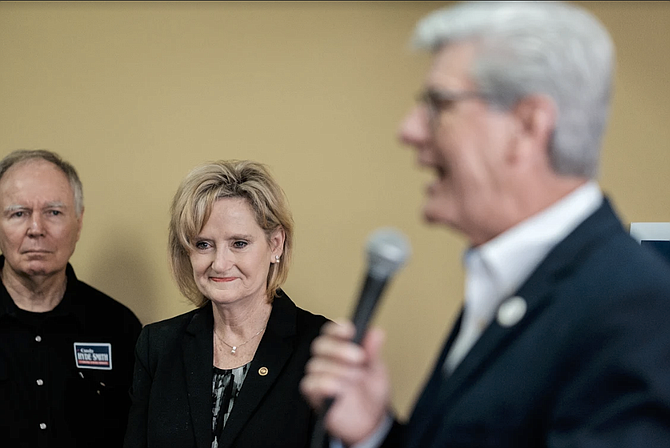Floodwaters “have placed a tremendous burden on the lives and property of thousands of Mississippians,” Sen. Cindy Hyde-Smith, said at a hearing on flooding in the Mississippi Delta. Gov. Phil Bryant said flooding has affected more than 1,100 homes. Photo by Ashton Pittman.
WASHINGTON (AP) — As Mississippi's governor toured massive flooding in the state, the Trump administration said Wednesday that it is giving another look to a long-dead flood control and drainage project in the Mississippi Delta that had been killed by the George W. Bush administration because of its potential impact on wetlands and wildlife.
The project, which the late Sen. John McCain once called "one of the worst projects ever conceived by Congress," had called for huge pumps to be built at the confluence of the Yazoo and Mississippi Rivers in Mississippi. It was rejected by the Bush administration in 2008.
"Had that veto not occurred, we believe that the flooding, particularly in the Yazoo backwater, would have been much less damaging," said Mississippi Gov. Phil Bryant, after touring the region by helicopter.
Opponents say the pumps could worsen flooding downstream.
After touring the flooded region, Bryant told journalists that he had spent Monday and Tuesday in Washington, lobbying the administration to override the 2008 EPAs decision to kill the project. On Wednesday, Environmental Protection Agency Administrator Andrew Wheeler confirmed to a Senate Appropriations subcommittee hearing that his agency is now reconsidering that 2008 decision.
Communities along the lower Mississippi River have been dealing with flooding for nearly two months. More than 500,000 acres (200,000 hectares) are submerged in the region, including more than 200,000 acres (80,000 hectares) of farmland. Farmers say flooding is harming them financially.
The U.S. Army Corps of Engineers and local agencies are deploying a complex system of levees, dams, floodgates and floodways to try to contain high water and limit damage along the more than 2,000-mile river.
Floodwaters "have placed a tremendous burden on the lives and property of thousands of Mississippians," Sen. Cindy Hyde-Smith, a Mississippi Republican, told Wheeler at Wednesday's hearing.
Bryant, who has aligned himself tightly with President Donald Trump, said Wednesday that more than 1,100 homes are affected, although some of those are not flooded, but in areas with roads cut off by flooding. Water is so common in the region that some people build small levees around their houses.
Environmentalists say the pumps would be capable of draining more than 200,000 acres (80,000 hectares) of wetlands — an area larger than all five boroughs of New York City.
The soggy and frequently flooded lowlands have comparatively few houses but are vital to waterfowl and other wildlife, environmental groups say. The National Wildlife Federation said the pumps would serve primarily "so large landowners can increase agricultural production on marginal lands that have always flooded."
Bob Irvin, president of the American Rivers conservation group, said in an email Wednesday that the EPA was moving to revive a "zombie" project.
"Nothing has changed since the first Bush administration recognized that the Yazoo Pumps project was an environmental disaster and an economic loser," Irvin said.
The Bush administration had invoked the Clean Water Act, saying it would cause "unacceptable damage" to valuable resources. At the time, it was one of only about a dozen times the federal water law had been invoked to reject a project outright.
The pump project has been heavily pushed by the Delta Council, a farming and business lobbying group that includes many large farmers in the fertile Mississippi Delta. Before retiring from the Senate, Thad Cochran, long a proponent of the project, made a final attempt last year to put language in a spending bill ordering pump construction to begin despite the EPA veto; it failed.
Sharkey County Supervisor Bill Newsom, who also manages a cotton gin, is one of many proponents of the pumps. He says farming is the only industry in the region, and says he doesn't want to drain the region's wetlands, just control flooding.
"We're just simply wanting to have a flood level we can live in," Newsom said last month.
Copyright Associated Press. All rights reserved. This material may not be published, broadcast, rewritten, or redistributed.



Comments
Use the comment form below to begin a discussion about this content.
comments powered by Disqus